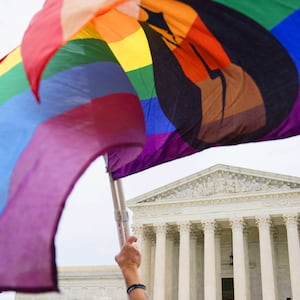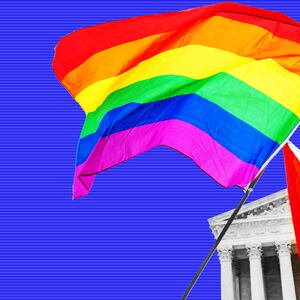For the last several years, adoption rights have been a primary battleground of the rights of LGBTQ people. And so far, the Christian Right has won every time, with several states and the federal government now permitting publicly-funded adoption agencies to turn away qualified gay couples for religious reasons.
Today, the Supreme Court announced that it’s getting into the fight.
The case it took today, Fulton v. City of Philadelphia, is straightforward on its facts. In March,2018, the city of Philadelphia stopped working with Catholic Social Services (CSS) because of that organization’s refusal to place foster children with qualified same-sex couples.
ADVERTISEMENT
Sharonell Fulton, who has fostered 40 children with CSS, is the named party in the lawsuit challenging that decision.
But the real power behind the case is Becket, formerly known as The Becket Fund, a hard-right activist group that has spearheaded several “religious liberty” cases, including Hobby Lobby, which eventually enabled corporations to deny contraceptive coverage to employees if doing so violated the company’s religious beliefs.
Though Becket says it “exists to defend the free exercise of all faiths, from Anglican to Zoroastrian,” its board, staff, and funding is dominated by extreme conservative Catholics. And most of its “religious freedom” cases are not about religious freedom itself but the specific right of religious people and businesses to discriminate against others, often on the basis of gender and sexuality.
With the Supreme Court itself dominated by religious conservatives who have taken unprecedented, far-right approaches to church-state questions, it is quite likely that Philadelphia will lose, and that states, cities, and the federal government will be required to devote taxpayer dollars to religious agencies that discriminate against LGBTQ people.
As the Daily Beast revealed in 2018, Becket, the Judicial Crisis Network (which promoted Justices Samuel Alito, Neil Gorsuch, and Brett Kavanaugh), and the Federalist Society (that vets President Donald Trump’s judicial nominees) are all part of the same network coordinated by the Catholic fundamentalist Leonard Leo, a member of the Knights of Malta.
Adoption is one of many recent battlegrounds between the rights of LGBTQ people and the “religious freedom” of persons seeking to discriminate against them.
For example, in the Masterpiece Cakeshop case, a Colorado baker refused to sell a wedding cake to a gay couple (even if a different baker in his store made the cake). In 2018, the Supreme Court ruled that the Colorado Civil Rights Commission was too hostile to the baker’s religious beliefs and overruled its finding that he had violated the law.
Since then, the case has been incorrectly interpreted as allowing all businesses to deny services to same-sex couples. There have been numerous similar cases involving wedding facilities, photographers, and florists, which have been decided in different ways over the years.
As well as the Fulton case, SCOTUS is also set to rule this year on whether Title VII of the Civil Rights Act encompasses sexual orientation and gender identity when it comes to prohibited grounds of discrimination, i.e. whether it’s legal to fire someone on the grounds that they are LGBTQ.
When it comes to adoption, the religious right has been on a winning streak.
Until a few years ago, it was understood that religious child welfare agencies (CWAs) receiving taxpayer funding had to make decisions based on the “best interests of the child.” This is critical, since in many states, religious organizations are the largest providers of foster and adoption services.
After same-sex marriage became legal nationwide, however, several states— South Carolina, Michigan, Texas, Virginia, Alabama, Mississippi, Oklahoma, Kansas, and the Dakotas—began passing religious exemptions, allowing religious CWAs to overrule the “best interests of the child” standard and turn away gay couples who had been found qualified to foster or adopt children.
Several lawsuits are working their way through the courts challenging these exemptions.
Ironically, some of these religious exemptions even hurt straight couples. In South Carolina, for example, Miracle Hill Ministries—the largest adoption provider in the state—turned away a Catholic potential parent because it only places children with “born again” Evangelicals.
Last year, Trump’s Department of Health and Human Services, whose “office of civil rights” is headed by yet another Leonard Leo associate, Roger Severino, granted a waiver to Miracle Hill.
Then, last fall, Severino’s office announced that it was making such waivers a national policy. Now, any religious CWA in the country could receive federal funding while still turning away gay parents.
With Fulton, the Supreme Court is poised to require cities and states to provide such waivers as well, effectively forcing all localities in the country to fund anti-gay discrimination with taxpayer dollars.
You read that right. Five years ago, it was dubious whether cities or states could allow anti-gay discrimination. Now, the Court may say that that they must allow it.
What’s more, none of this supposed conflict between religious freedom and LGBTQ rights is even necessary.
First, of course, religious CWAs could simply decline to take taxpayer money. That’s what happened in Massachusetts in 2004, when Catholic Charities withdrew from providing adoption and foster programs in Massachusetts rather than place children with same-sex couples. The world survived: Massachusetts contracted with non-discriminatory agencies, and Catholic Charities simply stopped taking public money.
Or, of course, religious CWAs could obey the secular law, as Jesus required. “Render unto Caesar the things that are Caesar’s, and unto God the things that are God’s.” (Matthew 22:21) In other words, obey the same laws as everyone else.
After all, no one is trying to take away religious freedom; the question is whether that religious freedom can be used to discriminate against someone else.
But of course, Becket and organizations like it aren’t really fighting for religious liberty. They’re fighting for religious hegemony; they want LGBTQ and women’s rights to be less equal than, say, civil rights. (No one is arguing that taxpayers should fund an agency that discriminates on the basis of race, after all—although conservatives argued exactly that in the '70s.)
They want a world in which my husband and I may be legally married but still not equal to legally married straight couples. A world in which we can be denied service, denied rights, and denied equality. A world in which we are second-class citizens.
Or not even citizens at all. Just last year, the State Department denied citizenship to a gay couple’s child conceived via gestational surrogacy and born overseas. Speaking personally, that’s terrifying; my daughter was conceived via gestational surrogacy. Does the government want to tear apart my family too?
Don’t be fooled. While the Fulton case will be described as a fight between LGBTQ equality and religious liberty, it’s really a fight between equality and discrimination. If you count up who’s sitting on the Supreme Court right now, who’s fighting this battle, and who put all of those people where they are, discrimination is going to win.






